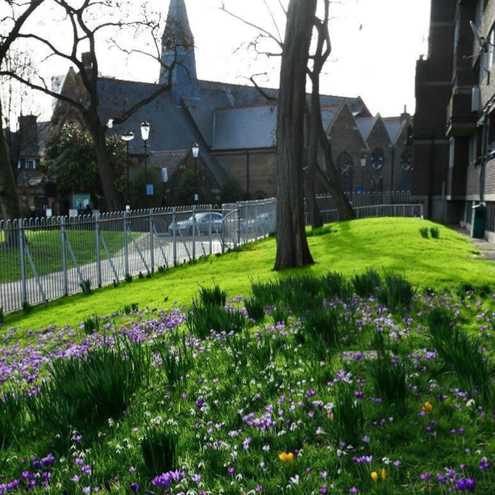Project showcase
PlanBee - Creating a resilient Garden Estate on Lancaster West Estate, Kensington & Chelsea – Royal Borough of Kensington and Chelsea with Lancaster West Neighbourhood Team

Climate change and the cost of living are two of the biggest challenges facing Londoners today. Plan Bee, initiated in 2018, has sought to address these issues together, improving access to shade, enhancing biodiversity and creating new community spaces where residents can grow and harvest their own food.
Who is on the project team?
Lancaster West Residents’ Association [LWRA], LWNT, Community Volunteers, Arup, Meristem, Urban Growth, Cameron Gardens.
Describe the context of this project and its neighbourhood and people?
On 14th June 2017, a fire broke out in Grenfell Tower on the Lancaster West Estate [LWE] in North Kensington, London. This tragedy resulted in 72 residents losing their lives and highlighted the legacy of systematic inequality within London’s housing sector. As part of the response, Lancaster West Neighbourhood Team [LWNT] was established, seeking to revolutionise the way social housing was managed, putting residents at the forefront of decision-making processes, delivering a model 21st century estate and the UK’s largest eco-neighbourhood.
LWE is at the highest possible risk of flooding, overheating and overall climate associated risks and has been identified as an area of deficiency in access to nature, meaning all residents live further than 1km from a site of importance for nature conservation (SINC) (sources: London Climate Risk Map, London 10-minute Walk Map, GiGL).
Across LWE 40.1% of residents were not born in the UK, with 18 languages spoken. There are significant differences in 1) income, with 10% of homes living in fuel poverty, 2) education, with only 31.5% of residents with a degree level qualification, and 3) employment, with 50% of residents in receipt of welfare benefits. Notting Dale also has above average levels of poor physical and mental health with life expectancy up to 10 years lower than the borough average.
The Grenfell Tragedy and the Covid-19 pandemic impacted thousands of residents and exacerbated these inequalities and deprivation in the area, compounded by the cost-of-living and the energy crises, residents of Lancaster West are facing unprecedented challenges.
What is your design approach?
Climate change and the cost of living are arguably two of the biggest challenges facing Londoners today. Plan Bee, initiated in 2018, has sought to address these issues, improving access to shade, and enhancing biodiversity whilst also creating new community spaces where residents can grow and harvest their own food. This has been achieved through the creation of three new community kitchen gardens, one new sensory garden, one Moroccan-themed terrace garden, three green roofs and extensive sitewide improvements to amenity grassland such as the planting of a prairie garden, a lavender garden, wildflower meadows and jasmine railings on blocks across the estate. Future plans for this project include a site-wide landscape study that will focus on the ecology, lighting, wayfinding, seating and crucially flood mitigation options for homes badly affected by the floods in Summer 2021.
In addition to providing residents high quality and calming spaces that can be used as respite from local disruption such as the planned refurbishment works, and from global disruption associated with climate change, this project is actively developing green skills that help London to secure the green supply chain. Also providing residents with skills that will become more desirable in the future, increasing employability and volunteering opportunities.
This multi-faceted approach, merging together landscaping for flood mitigation, climate adaptation, creation of an accessible, pleasant, and biodiverse space and an extensive programme of community engagement, volunteering and apprenticeship opportunities will seek to bridge the gap between persistent socio-economic inequalities and climate mitigation on Lancaster West Estate.
What is your climate strategy?
The environmental benefits of this project can be quantified best by the creation and improvement of green infrastructure. Since inception in 2018 LWNT have biodiversified 1000m2 of existing green space and transformed an additional 2000m2 from underused grey space to new biodiverse green space, no small task within a central London borough! In 2019 this was kick-started by the installation of two living green walls, the first of any social housing estate in the borough. Throughout the next year projects including a sensory garden, a climate adapted rain garden and a biodiverse swale will add 660m2 of green space biodiversified and 100m2 of grey space turned green. Overall, these contributions have improved the Urban Greening Factor of LWE by 0.07, bringing it up from 0.37 to 0.45, well over the borough and London targets of 0.4.
In 2022 LWE became the first estate in the Royal Borough of Kensington and Chelsea to be awarded the Green Flag Award, a mark of recognition in excellence for green space management. In 2023 the projects that have been undertaken within PlanBee have been recognised as part of the borough’s published Bee Superhighway map, adding a substantial 15 new sites.
Future goals for PlanBee include maximising the potential for blue infrastructure, with plans for the installation of SuDS within any feasible garden space, redirecting roof run-off into planters and localised swales and reducing pressure on the existing sewer system. This will connect into a borough-wide network of SuDS with far-reaching impacts beyond estate boundaries.
How have you engaged the community?
Improving the green spaces on the estate has led to ever-growing interest from residents dedicated to enhancing nature, both for the benefit of their homes and also for the planet. To date, LWNT has supported 143 individual resident volunteers (25-30 of whom are regular attendees) and 76 corporate volunteers, overall contributing 4607 hours of volunteer time towards the upkeep of spaces created by PlanBee. The volunteers are facilitated by our Community Garden Coordinator, Robert Pereno, a resident of the estate for 27 years.
The tireless work of Robert, the residents and the volunteers have drawn interest from local organisations such as the Design Museum and the Natural History Museum, who have both participated and even hosted community days within the gardens on the estate. Recently, the newly completed Secret Garden, one of the community kitchen gardens co-designed and delivered by residents, received Royal attention, with the Duke of Kent, in partnership with the Tree Council, planting a new tree named ‘Plum MallingTM Elizabeth®’ in honour of The Queen’s lifelong dedication to the nation.
The physical and mental benefits of improving green spaces and giving residents the autonomy to do so is well documented. An unexpected but welcomed social impact is the potential of these spaces to bring together residents, community organisations, businesses, local restaurants and more, creating a unique sense of togetherness that extends beyond just the green spaces of Lancaster West and out into the community.
Festival of Pineapples
24-26 February 2026
Pineapples prize giving night
April
Pineapples at Festival of Place
10 June 2026
© The Pineapples - Tweak Ltd. 124 City Road, London, EC1V 2NX. Tel: 020 3326 7238




